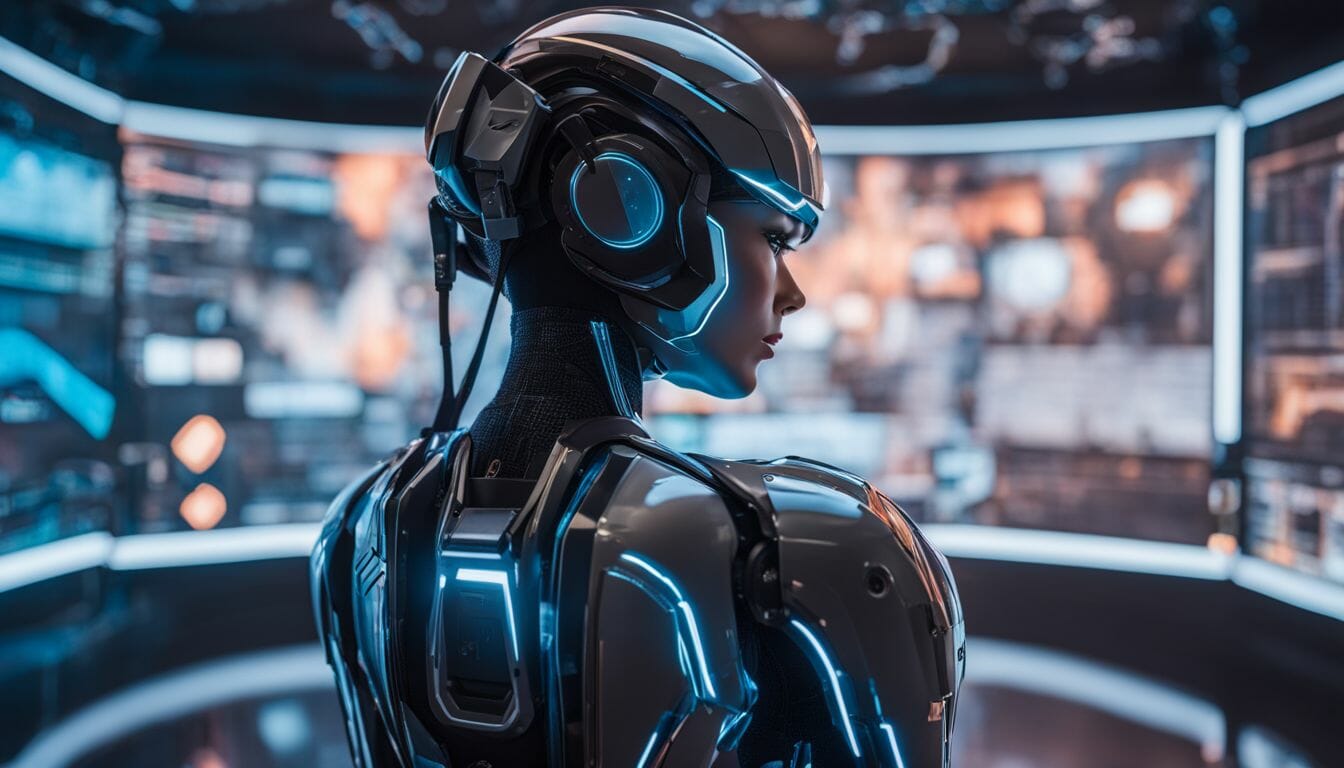Will AI Replace Marketing Jobs? The Rise of AI
As we witness the rise of AI, many marketing professionals are concerned about their job security. A survey reveals that over 55% of digital marketers believe AI could replace them.
In this article, we will explore and demystify ai technologies and the impact of AI on marketing jobs and provide helpful strategies for adapting to this technological wave. Ready to dive into the transformative world of AI in marketing?
Key Takeaways
AI is transforming the field of marketing by automating routine tasks, analyzing large data sets, and creating digital assistants.
Certain skill sets in marketing jobs have the potential to be replaced by AI, such as data collection and analysis, ad targeting, customer segmentation, and basic content creation.
However, there are skills that AI cannot replace, including human judgment, creativity, empathy, human expertise, emotional intelligence, storytelling skills, and adaptability.
Marketers can adapt to the rise of AI by staying updated with AI trends, recognizing which skill sets are replaceable by AI tools,
Understanding the Role of AI in Marketing

AI plays a vital role in marketing by automating routine tasks, compiling and analyzing large data sets, and creating digital assistants.
Automation of routine tasks
AI is now doing many jobs that people used to do. For example, it can sort and group data. It can also make reports and check the quality of work. AI helps marketers in saving time for other tasks which need more thought and creativity. Business Process Automation with AI will remove many of the repetitive and tedious tasks marketers once performed.
Not only this, but chatbots are now helping customers too! They answer questions, solve problems and offer support any time of the day.
Compilation and analysis of large data sets
AI uses machines to look at data. Lots of it. It takes the numbers and facts and turns them into useful info for marketers. This job used to take a long time for humans to do and could cause errors.
Now, AI can finish this work in no time with no mistakes! Placing ads can be better with AI's help too. The big amounts of user data let marketers target their ads well. With this, the right people see your ad at the best time.
Creation of digital assistants
AI tools help make digital assistants. These are like Siri or Alexa. You talk to them and they answer you back. They can do things for you, too. For example, they can send emails or set alarms for you.
This makes work easier for people in marketing jobs. AI helps these helpers learn more each time they do a job so they get better at it over time.
The Impact of AI on Marketing Jobs

AI has the potential to replace certain skill sets in marketing jobs, but there are skills that AI cannot replace.
Potential replacement of certain skill sets
AI has the capacity to replace certain skill sets within the marketing industry, especially in tasks that are routine and repetitive. These include data collection, analysis, and reporting, ad targeting, customer segmentation, and basic content creation. This potential replacement of certain skills brings both challenges and opportunities for many marketing managers and professionals.
Skill Set Replacement by AI
- Data Collection, Analysis, and Reporting: Around 55.5% of digital marketers in the US believe that AI will take over these tasks, automating the collection and interpretation of vast amounts of data. This could save companies significant amounts of money on staffing and tool costs.
- Ad Targeting and Customer Segmentation: AI's ability to analyse and understand customer behaviours could lead to more accurate ad targeting and customer segmentation, potentially replacing these skill sets. 56.7% of freelancers and 56.1% of in-house digital marketers see this as a real possibility.
- Basic Content Creation: AI has the potential to automate basic content creation, with 54.1% of digital marketing agency professionals believing this could happen in the near future. However, it also presents a challenge for marketers who need to adapt and enhance their skills to continue offering value in their own marketing roles too.
The rise of AI in marketing may sound intimidating for some professionals, with almost 40% expressing some level of concern about AI's impact on digital marketing. However, it's also worth noting that almost 44% of digital marketers feel AI will have a positive impact on their career, highlighting the potential for AI to augment rather than replace certain skill sets.
Identification of skills that AI cannot replace
AI has its limitations when it comes to certain skills in marketing. Here are some skills that AI cannot replace:
Human judgment: AI may be able to process and analyze data, but it lacks the ability to make subjective judgments and decisions based on context, intuition, and experience.
Creativity: AI is not capable of coming up with original ideas or creative concepts. The ability to think outside the box and create unique marketing campaigns is a skill that remains exclusive to humans.
Empathy: Understanding human emotions and empathizing with customers is crucial in marketing. AI cannot replicate the emotional connection that humans can establish through personalized interactions.
Human expertise: Years of experience and domain knowledge in specific industries or market trends provide marketers with valuable insights that AI cannot match.
Emotional intelligence: Building relationships, understanding customer needs, and providing exceptional customer service requires emotional intelligence, which AI lacks.
Storytelling: Crafting compelling narratives and engaging stories is an art form that requires human creativity, imagination, and the ability to connect with audiences on an emotional level.
Adaptability: Marketers need to constantly adapt their strategies to changing market dynamics, consumer behaviors, and emerging trends. The flexibility and adaptability required for this task are inherent skills possessed by humans.
How Marketers Can Adapt to the Rise of AI

Marketers can adapt to the rise of AI by staying up-to-date with AI trends, recognizing which skill sets are replaceable, and embracing AI for increased productivity.
Staying updated with AI trends
To adapt to the rise of AI in marketing, it is essential for marketers to stay updated with the latest AI trends. This means keeping an eye on industry news and developments related to artificial intelligence.
By staying informed about new technologies, tools, and applications in AI, marketers can better understand how they can leverage these advancements to enhance their marketing strategies.
Additionally, staying updated with AI trends allows marketers to anticipate potential changes in the industry and adapt accordingly. With over 50% of digital marketers believing that AI will replace human marketers in the near future, staying ahead of the curve is crucial for career growth and success in the field.
Recognising replaceable skill sets
AI technology in marketing has the potential to replace certain skill sets. Here are some skills that marketers should recognize as potentially replaceable:
Data Entry and Analysis: AI can automate data entry and analysis tasks, reducing the need for manual input and analysis.
Routine Task Execution: Tasks such as scheduling social media posts, ad campaign optimization, and email automation can be efficiently handled by AI.
Content Generation: AI tools can generate content like news articles, product descriptions, and even social media posts based on data inputs and algorithms.
Pattern Recognition: AI algorithms can analyze large data sets to identify patterns in customer behavior, allowing for more targeted marketing strategies.
Customer Segmentation: With AI's ability to analyze vast amounts of customer data, it can create accurate customer segments for personalized marketing campaigns.
Predictive Analytics: AI algorithms can make predictions about market trends or customer behavior based on historical data, assisting in decision-making processes.
Ad Campaign Optimization: AI-powered systems can optimize campaigns by analyzing factors such as targeting, bidding strategies, and creative elements to maximize performance.
Chatbots and Customer Service Automation: AI chatbots can handle common customer inquiries and provide instant assistance without human intervention.
Embracing AI for increased productivity
AI can greatly enhance productivity in the field of marketing. By embracing AI tools and technologies, marketers can streamline their workflow, automate repetitive tasks, and free up more time for strategic decision-making.
For example, AI can assist in managing pay-per-click ads, automating email responses, and even curating content. With these tasks taken care of by AI systems, marketers can focus on higher-level activities such as developing creative strategies and building meaningful connections with customers.
By leveraging the power of AI to increase efficiency and effectiveness, marketers can stay ahead in today's competitive landscape.
Future Scenarios: AI in Marketing

Discover the exciting possibilities of AI in marketing, from an artificially intelligent future to a world where AI collaborates seamlessly with human marketers. Read more to explore how AI is shaping the future of the industry!
Artificially intelligent future
In the future, AI is expected to become even more advanced and capable. This means that marketing will increasingly rely on artificially intelligent systems and technologies. AI will be used to create personalized marketing strategies, predict trends, and engage customers in a more targeted manner.
With the ability to automate tasks like data analysis and ad targeting, AI is likely to revolutionize the marketing industry. However, it's important for marketers to adapt and stay updated with these advancements in order to remain relevant in an artificially intelligent future.
Artificially augmented future
In an artificially augmented future, AI will play a significant role in enhancing the capabilities of human marketers. Through advanced technology and algorithms, AI will assist marketers in analyzing vast amounts of data, identifying patterns, and predicting consumer behavior.
This augmented future will enable marketers to make data-driven decisions with greater accuracy and efficiency. AI-powered tools such as chatbots and digital assistants will enhance customer engagement and provide personalized experiences.
While AI may automate certain tasks, its true potential lies in collaborating with humans to amplify their expertise and creativity in marketing strategies.
Artificially dominant future
In an artificially dominant future, AI may become the driving force behind marketing strategies. It could take over tasks like data analysis and customer segmentation, using its ability to process large amounts of information quickly.
AI-powered digital assistants might also play a significant role in executing marketing campaigns and interacting with customers on various platforms. While this may lead to certain job roles being replaced by AI, it's important for marketers to adapt and embrace the technology in order to stay relevant in this changing landscape.
According to surveys, over half of digital marketers believe that AI will replace human marketers in the near future, emphasizing the need for professionals to stay updated with AI trends and recognize which skills cannot be replaced by machines.
Conclusion
So will AI replace marketing jobs? Lots of people are worried about their future, will AI replace software developers, will AI replace accountants, will AI replace copywriters, will AI replace therapists? There are so many articles covering these worries that you've got to take notice.
In conclusion, while AI is transforming the field of marketing, it is unlikely to completely replace human marketers. Instead, AI can enhance their work by automating routine tasks and providing valuable insights from data analysis.
Marketers should embrace AI as a tool to increase productivity and focus on higher-level strategy and creativity. By adapting and collaborating with AI technology, marketers can stay ahead in a rapidly evolving digital landscape.
FAQs
Will AI replace marketing jobs completely?
No, AI is not expected to completely replace marketing jobs. While AI can automate certain tasks and processes, human creativity, intuition, and strategic thinking are still valuable in the field of marketing.
What roles may be impacted by the rise of AI in marketing?
The rise of AI in marketing may impact roles that involve repetitive tasks such as data analysis, reporting, and campaign optimization. However, it also presents opportunities for marketers to focus on more complex and creative aspects of their work.
How can marketers adapt to the rise of AI?
Marketers can adapt to the rise of AI by developing skills related to data analysis, machine learning algorithms, and leveraging automation tools effectively. Additionally, focusing on areas where human insight and creativity are essential will be crucial for staying relevant.
What are the benefits of integrating AI into marketing strategies?
Integrating AI into marketing strategies can lead to improved personalization efforts, enhanced customer targeting and segmentation capabilities, increased efficiency in campaign management, and better insights through advanced analytics.
